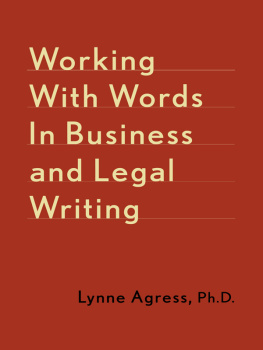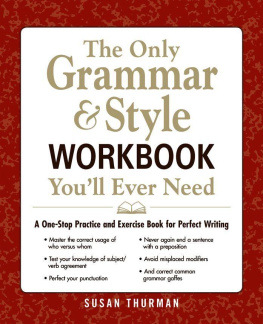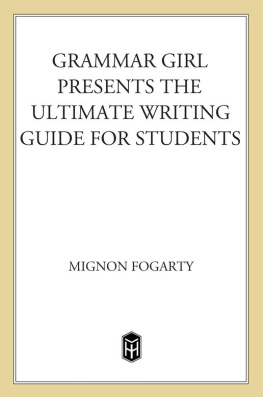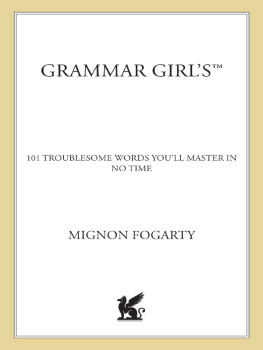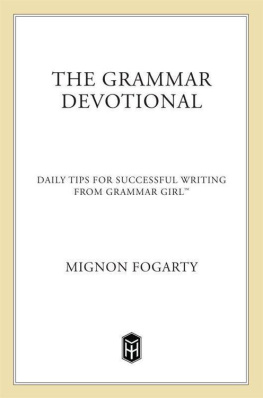
Its a presumptuous task to choose 101 words that smart people use. Who says whats smart? Whats the difference between a well-crafted sentence and a pompous sentence? How could you possibly choose just 101 words? These were the thoughts on my mind as I began this book.
I started with a long list of candidates, and the words that were easy to reject helped clarify in my mind the types of words I should include. For example, I considered ligature, but it was too obscure; banal, but it seemed too easy; catholic, but the secular use is too easily lost or misinterpreted among the mountain of religious uses; and quotidian, but every use I could find seemed unnecessary and pretentious.
Many of the words that made the cut are at least familiar to most people, but convey an especially deep meaning when the reader has an understanding of history ( Machiavellian, bowdlerize, Rubicon ), different cultures ( Talmudic, Sisyphean, maudlin ), or philosophy ( existential ). The words are also general enough that most prolific writers could find a reason to use them on occasion.
In his essay Politics and the English Language, George Orwell wrote, Never use a long word where a short one will do, and its generally good advice, but sometimes, the short word wont do. Sometimes the five-dollar word really does add a nuance you cant get with a short word. In many cases, the words in this book provide extra layers of meaning over more common, similar words.
Limiting the words to 101 turned out to be the challenge I couldnt overcome. Thats all we get! I would never argue that these are the best 101 words smart people use or the definitive list of smart person words, but I believe they are an excellent start. If you master these words, youre well on your way to sounding like a master of the English language.
Ab jur e and jur y both share the Latin root for swear. Whereas a jury swears an oath, to abjure is to swear something off, to forswear it. Abjuring can be a formal act sealed by an oath, or an informal act similar to recanting a statement or shunning a person or activity.
I abjure you, Alcide said. Colonel Flood winced, and young Sid, Amanda, and Culpepper looked both astonished and impressed, as if this were a ceremony theyd never thought to witness. I see you no longer. I hunt with you no longer. I share flesh with you no longer.
Charlaine Harris in the Sookie Stackhouse novel Dead to the World
I have from an early age abjured the use of meat, and the time will come when men such as I will look upon the murder of animals as they now look upon the murder of men.
Leonardo da Vinci
The root of ana chron ism is the Greek word khronos, which means time. Youll find the same root in other time words such as chronology and chronographer . Anachronism literally breaks down to against time, and we use it to describe something that is out of place in time, usually something that seems old fashioned. For example, some young people in Britain believe their monarchy is an anachronism, that it is an out-of-date institution without much relevance in the modern world.
Since the arrival of container ships in the 1960s, with their need for giant cranes and open acres of wharfage, the 43 deepwater finger piers of San Franciscos northeastern waterfront have largely become an anachronism . No longer used for cargo, some serve cruise ships, ferry boats and tour boats; others have taken on new, nonmaritime uses.
David Littlejohn writing for The Wall Street Journal
Anathema comes from a Greek word describing something that was cursed or devoted to evil, and later, in Latin, anathema was associated with excommunication. For example, in the 1200s, the Catholic Church enacted various levels of excommunication and the most severecutting a person off from God and the Church, proclaiming him damnedwas also called anathematization. The curse read during the excommunication ceremony was called the anathema.
Today, something that is anathema is hated, repulsive, or cursedthe epitome of evil.
Elizabeth Warren, the Harvard law professor and consumer advocate who is currently a special adviser to the president, is charged with setting up the [consumer finance protection] bureau. She remains a hugely popular figure among many Democrats and anathema to many Republicans.
Deborah Solomon writing for The Wall Street Journal
Anodyne comes from a Greek word that means painless, and it was originally used in English to describe a drug or treatment that eased pain such as opium, liquor, or herbal remedies.
Today, it is more commonly used as an adjective that carries of sense of sedating, soothing, or bland comfort.
Musica + Alma + Sexo was an opportunity for [Ricky] Martin to redefine his two-decade career for American audiences, and demonstrate that he is much more than the goofy pop singer who scored several anodyne crossover hits at the turn of the millennium.
Tris McCall writing for The Star-Ledger (New Jersey)
There was something soothing and alienating all at once about the anodyne upper-middle-class blandness of the neighborhood.
Kirsten Tranter in The Legacy
Atavistic comes from the Latin word for ancestor. Its meaning is close to primitive, with a dash of resurgence thrown in. Something primitive has always been primitive, but an atavistic emotion is something primitive that surfaces even though people believed they had overcome or lost it.
I might have come away from the annual [Super Bowl] experience howling in the streets for my avenged Jets, had not my viewing been sullied by an atavistic rash of misogynistic commercials.
Edward Champion writing for Reluctant Habits
That is the political imperative that drives Chinas exchange-rate policy right now, regardless of how much atavistic chest thumping comes out of Washington.
Paul Maidment writing for Forbes
Avant-garde sounds foreign, and it is: it comes to English from French words that mean advance, before, or front and guard: the avant-garde is the group on the forefront. Youre avant-garde if youre on the cutting edge of your field and always trying new things. Anyone can be avant-garde, but the term is often applied to creative types.
[Morton Subotnicks] wife, Joan La Barbara, is a celebrated avant-garde vocalist whose repertoire includes pioneering work with experimental techniques like ululation and circular singing.



